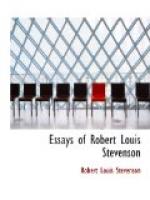[Note 41: Calvinism. If this word does not need a note yet, it certainly will before long. The founder of the theological system Calvinism was John Calvin, born in France in 1509. The chief doctrines are Predestination, the Atonement (by which the blood of Christ appeased the wrath of God toward those persons only who had been previously chosen for salvation—on all others the sacrifice was ineffectual), Original Sin, and the Perseverance of the Saints (once saved, one could not fall from grace). These doctrines remained intact in the creed of Presbyterian churches in America until a year or two ago.]
[Note 42: Two bob. A pun, for “bob” is slang for “shilling.”]
[Note 43: Never read Othello to an end. In A Gossip on a Novel of Dumas’s, Stevenson confessed that there were four plays of Shakspere he had never been able to read through, though for a different reason: they were Richard III, Henry VI, Titus Andronicus, and All’s Well that Ends Well. It is still an open question as to whether or not Shakspere wrote Titus.]
[Note 44: A liberal and pious education. It was Sir Richard Steele who made the phrase, in The Tatler, No. 49: “to love her (Lady Elizabeth Hastings) was a liberal education.”]
[Note 45: Trait d’union. The French expression simply means “hyphen”: literally, “mark of connection.”]
[Note 46: Malvolio. The conceited but not wholly contemptible character in Twelfth Night.]
[Note 47: The Egoist. The Egoist (1879) is one of the best-known novels of Mr. George Meredith, born 1828. It had been published only a very short time before Stevenson wrote this essay, so he is commenting on one of the “newest” books. Stevenson’s enthusiasm for Meredith knew no bounds, and he regarded the Egoist and Richard Feverel (1859), as among the masterpieces of English literature. Daniel Deronda, the last and by no means the best novel of George Eliot (1820-1880), had appeared in 1876.]
V
A GOSSIP ON ROMANCE
In anything fit to be called by the name of reading, the process itself should be absorbing and voluptuous; we should gloat over a book, be rapt clean out of ourselves, and rise from the perusal, our mind filled with the busiest, kaleidoscopic dance of images, incapable of sleep or of continuous thought. The words, if the book be eloquent, should run thence-forward in our ears like the noise of breakers, and the story, if it be a story, repeat itself in a thousand coloured pictures to the eye. It was for this last pleasure that we read so closely, and loved our books so dearly, in the bright, troubled period of boyhood. Eloquence and thought, character and conversation, were but obstacles to brush aside as we dug blithely after a certain sort of incident, like a pig for truffles.[1]




